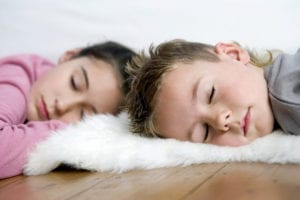When your child is having trouble falling asleep, it’s an irritating experience for both the parents and the child. Lack of sleep in children can lead to loss of motivation and attention for everyday tasks, increased forgetfulness, blurred vision, difficulty learning new information, and increased stress throughout the day (1).
It seems like children’s difficulty falling asleep is becoming more and more of an issue. It’s no wonder why many parents look to sleep aids to help their children fall asleep.
Melatonin is a popular sleep aid used by many adults and generally interpreted by consumers as safe for kids. There are many melatonin products on the market now that are specifically marketed for kids.
 Melatonin is a hormone that’s made by the pineal gland in the brain, melatonin helps control your daily sleep-wake cycles (2). The melatonin that is available for purchase at the grocery or drug store is a synthetic form of this hormone. Although some find these products effective, long term effects of giving melatonin to kids has not been studied. Common side effects of melatonin use include extreme drowsiness, dizziness, headache, and nausea (3). The effects of Melatonin that our body naturally produces goes beyond sleep. It also plays a role in the way a person’s body matures sexually. Melatonin levels have an impact on how the ovaries and testes function. The effects that synthetic melatonin has on a child’s sexual development are currently unknown(4).
Melatonin is a hormone that’s made by the pineal gland in the brain, melatonin helps control your daily sleep-wake cycles (2). The melatonin that is available for purchase at the grocery or drug store is a synthetic form of this hormone. Although some find these products effective, long term effects of giving melatonin to kids has not been studied. Common side effects of melatonin use include extreme drowsiness, dizziness, headache, and nausea (3). The effects of Melatonin that our body naturally produces goes beyond sleep. It also plays a role in the way a person’s body matures sexually. Melatonin levels have an impact on how the ovaries and testes function. The effects that synthetic melatonin has on a child’s sexual development are currently unknown(4).
A likely factor to this problem of increased child restlessness is the prevalence of screens in our everyday lives. Screens like TV’s phones, and tablets, emit light. Light plays a big role in the regulation of our sleep-wake cycle known as circadian rhythm. The release of melatonin is stimulated by darkness and suppressed by light (4).
Here are some habits you should form with your child as an alternative to using melatonin:
- Set a consistent bedtime and waketime : Waking up and going to bed at the same time everyday can help train your child’s internal clock. Making it easier for them to fall asleep.
- Limit screen time in the 2-3 hours before bedtime: Electronics like TV and tablets emit light that disrupt the body’s natural melatonin production.
- Help them to relax: Stressful energy can keep your child from being able to fall asleep. Find something that relaxes them like reading to them or listening to gentle music.
- Create a night time routine: Getting into a routine helps your body know that it’s time to go to sleep.
- Use of gentle and safe herbal sleep aids: Shhh…Tummy and Teething Drops is an effective formula, safe for babies and children. It contains a thoughtful blend of organic herbs to help maintain a healthy digestive system and provide gentle sleep support.
This article is for educational purposes only and should not be used as medical advice. Please consult with your medical provider before making any health care or medical decisions.
Sources:
(1)
https://www.aboutkidshealth.ca/Article?contentid=645&language=English
(2)
https://www.sleep.org/articles/melatonin/
(3)
https://healthblog.uofmhealth.org/wellness-prevention/are-melatonin-supplements-safe
(4)
